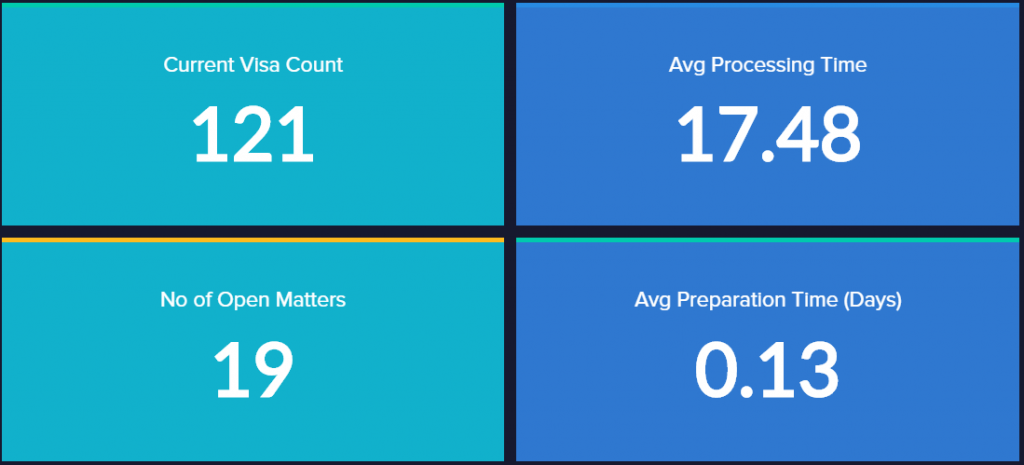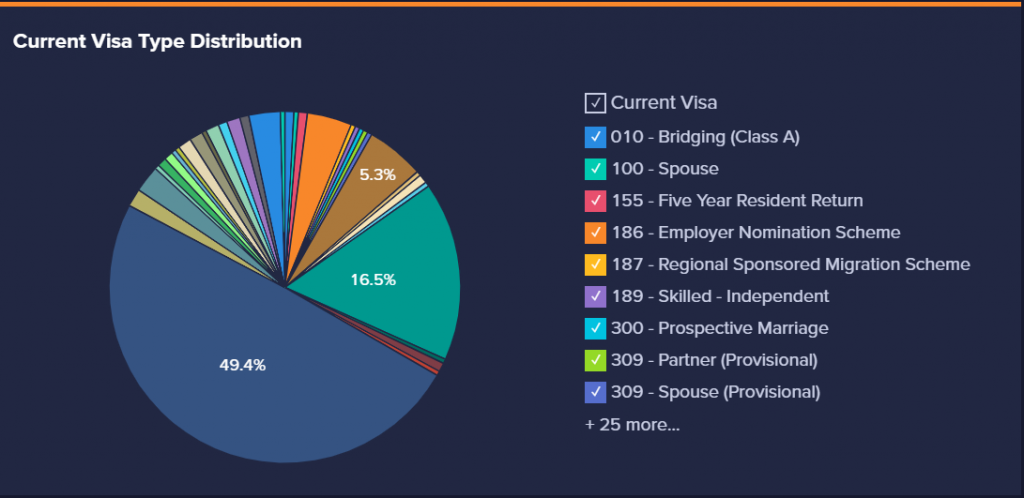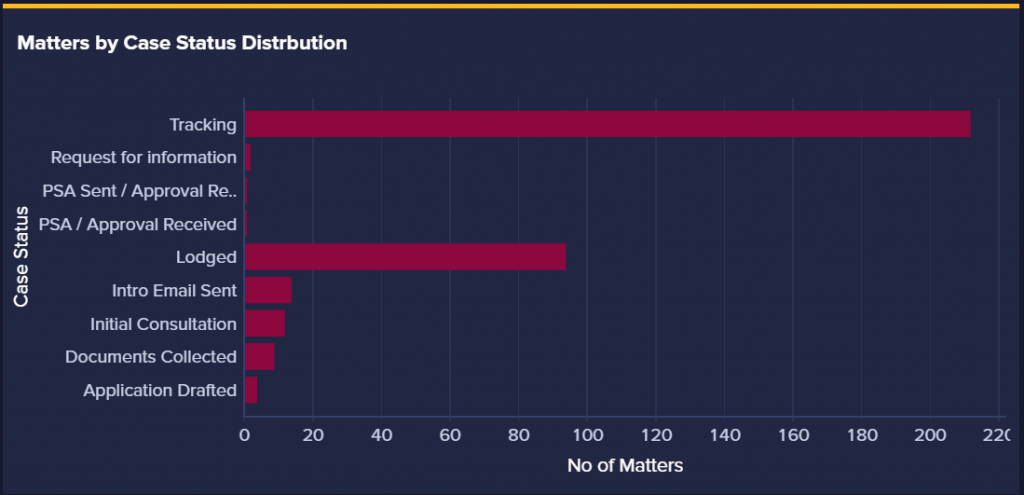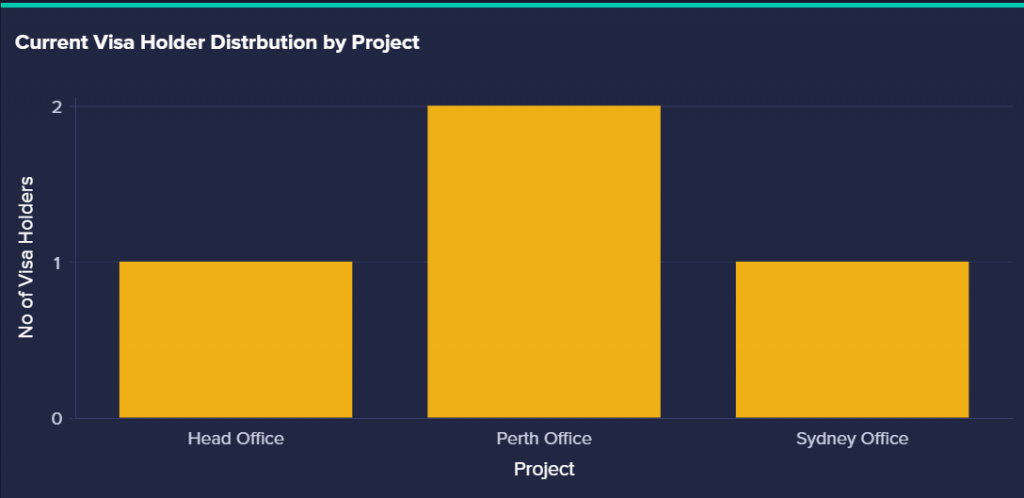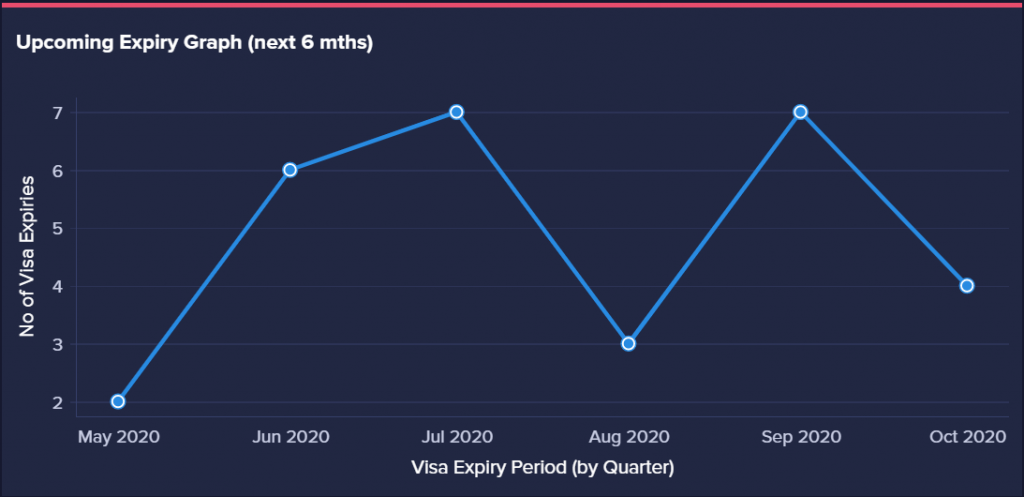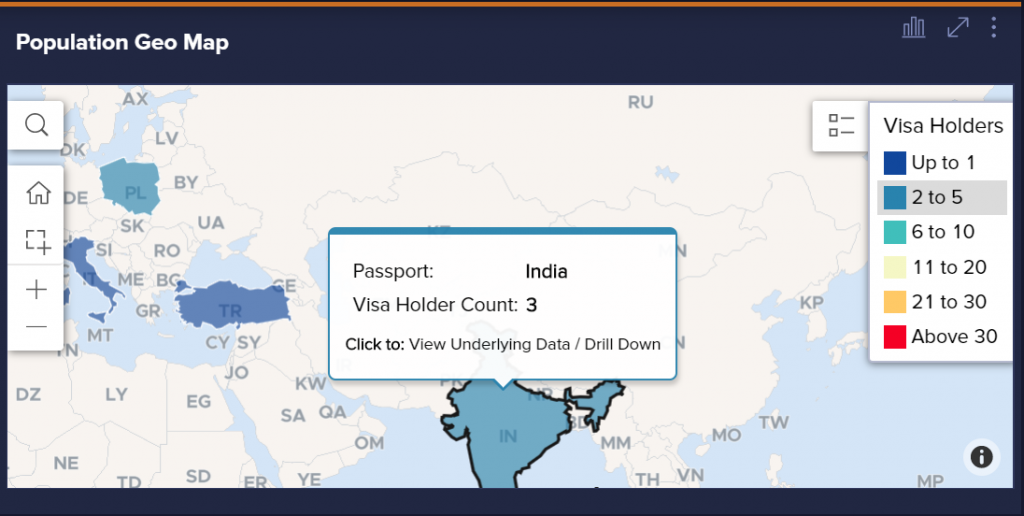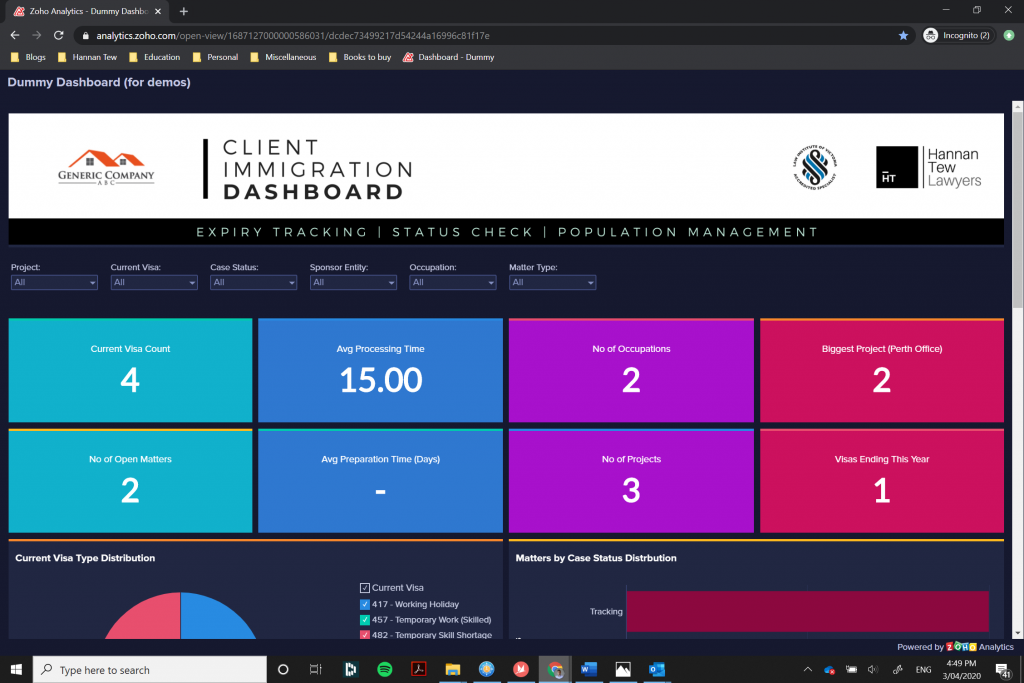Businesses can sponsor certain foreign workers for a TSS Subclass 482 visa.
The Temporary Skill Shortage (Subclass 482) visa is the temporary component of the employer sponsored visa program. See if your business can bring in skilled workers here.
Temporary Skills Shortage (Subclass 482) (TSS) Visa
The TSS visa is a temporary visa which has pathways to permanent residence, though this is dependent on a number of factors including the occupation, age, or salary. For further information, click the FAQs button on the top right or contact us directly through here. You can also read more about the ENS visa, the permanent visa in this program, here.
Target Market
- Established businesses in Australia
- Established business overseas seeking to enter Australia
- Employees with job offers from companies
Visa applicant requirements
- Qualifications that match the role
- At least 2 years of experience in similar positions
- Genuine intention to work in the nominated position
- Mandatory licensing, registration or professional membership requirements
- Adequate arrangements for health insurance
- Health, character and English requirements
Company (sponsorship) requirements
- Actively and lawfully operating in Australia or
- Actively and lawfully operating overseas but requiring the visa applicant to establish an Australian business or fulfill contractual obligations
Position (nomination) requirements
- A genuine, full time position
- In the sponsor’s business (or that of an associated entity)
- A salary in line with market rates
- Subject to Labour Market Testing (LMT)
- On the relevant occupation lists
Eligibility
Temporary Skills Shortage (Subclass 482) (TSS) Visa
Be aware that there are certain differences in eligibility requirements for shor term stream Temporary Skill Shortage (Subclass 482) (TSS) visa applicants and medium term stream TSS visa applications. In all cases, this is general information and you should contact us or an immigration lawyer prior to making any decisions.
Sponsorship requirements
The first step is to obtain business sponsorship approval by applying and demonstrating that the business:
- has a legally established and currently operating business
- does not have any adverse information recorded against it
The business then assumes a number of sponsorship obligations, including assuming certain costs, ensuring your employee only works in their nominated occupations, and is subjected to equivalent terms and conditions of employment as your Australian workers. You will only need to apply for sponsorship once every 5 years.
Nomination requirements
The second component is the nomination application, where the business nominates a position within the organisation. Generally, the position must:
- be a genuine, full-time position;
- have a salary in line with market rates;
- be subject to Labour Market Testing (see here); and
- be on the relevant occupation lists (see here).
If the position is on the Short-Term Skilled Occupation List (STSOL), the candidate may be eligible for an up to 2-year visa. The applicant will also need to demonstrate that they are a “genuine temporary entrant”. If the position is on the Medium to Long Term Strategic Skills List (MLTSSL), the candidate may be eligible for an up to 4 year visa.
Visa eligibility
The third step is the visa application. At this stage, the main applicant must:
- have relevant skills and qualifications that match the role;
- have at least 2 years of experience in a related position;
- have a genuine intention to work in the nominated position;
- meet mandatory licensing, registration, or professional membership requirements;
- have adequate arrangements for health insurance; and
- satisfy health, character, and English requirements.
The applicant’s family members can be included in the TSS visa as secondary applicants, including their spouse/de facto partners and dependent children. They will be granted the same full working rights as the primary applicant, though they are not tied to working for the sponsor.
Labour Market Testing
The Temporary Skill Shortage (Subclass 482) (TSS) visa requires the nominated position to be assessed as “genuine” by the DHA. There are instances where an application may be assessed as “non-genuine”, such as where the applicant is related to the sponsor or the position is created specifically for the applicant.
In addition, Labour Market Testing (LMT) must be conducted by the Standard Business Sponsor, where they have to provide evidence that there was an attempt to hire local citizens or permanent residents to justify that the local labour market cannot fulfil the nominated position.
Sponsorship obligations
It is important that the applicant and Standard Business Sponsor follow the statutory obligations and conditions of the Temporary Skill Shortage (Subclass 482) (TSS) visa if, and when, it is approved.
A breach of the visa conditions may result in visa cancellations for the visa holder and/or prevent the business from sponsoring further workers under the scheme
As a brief summary, a sponsor must:
- advise the DHA about changes to the business, its solvency, and the nature of the visa holder’s work changes from that of the nominated position
- ensure the visa holder works in the occupation which they were nominated for
- ensure the terms and conditions are “fair”, being the same as stated as per the nomination application and not less favourable than that of an equivalent Australian worker
- ensure they do not engage in discriminatory recruitment practices and maintain records to show that discrimination based on visa or citizenship did not occur during the recruitment process for the TSS visa holder
- maintain adequate records to evidence compliance with the sponsorship obligations
- provide records and information if requested by a DHA officer and cooperate with DHA inspectors, when required; and
- be responsible for all sponsorship costs, relocation costs, and travel costs of the visa holder
The full sponsorship obligations are here: https://www.hannantew.com.au/sponsorship-obligations/.
Documents
Temporary Skills Shortage (Subclass 482) (TSS) Visa
The actual documents you require are dependent on your particular circumstances including (but not limited to) your family members, your health and character, your identity and your occupation. Your Hannan Tew advisor will provide you with a link to the Hannan Tew portal which will set out the specific documents required.
Sponsorship documents
- An Australian Business Number (ABN) registration certificate if you are an Australian-based employer
- An Australian Registered Body Number (ARBN) registration certificate if you are an overseas business registered to operate in Australia
- Evidence of registration in the country you operate in if you do not currently operate in Australia
- If your business has a registered business or trading name, provide a copy of the Business Names Details extract from Australian Securities and Investment Commission’s (ASIC) business name register
- If you are a larger or an established business that has operated over a number of years, provide:
- profit and loss statements
- annual report for the most recently concluded financial year
- If you are a smaller or recently established business, provide:
- tax returns for the most recently concluded financial year
- recent business activity statements (BAS)
- recent bank statements
- If you are a new business provide a business plan which includes contracts to provide services, contracts for lease / purchase of business premises, evidence of employment of staff
- If your business is not yet operating in Australia, show your intention to set up in Australia or that you have a contractual obligation to set up in Australia
Nomination documents
- Organisational chart
- Employment contract
- Letter of support from accountant confirming business is a going concern
- Market salary report (AMSR)
- Labour Market Testing (LMT) requirement (see here)
- Genuine position summary confirming that occupation is in line with the ANZSCO description. position fits into the business.
Visa documents
- Biographical pages of your current passports or travel documents
- Full quality passport sized photograph of yourself
- Evidence of your health assessment (we will advise you if this is required after we receive your completed questionnaire)
- Police certificates for any country (including Australia) if you have lived for a cumulative period of 12 months or more.
- Passport bio data page for each family member
- Full quality passport sized photograph of each family member
- Birth certificate for each family member (translated)
- If in a married relationship, a copy of your marriage certificate (translated)
- If in de facto relationship, evidence of at least 6 months of (i) shared finances (bank / credit card statements) (ii)living together (lease, correspondence at same address) and (iii) social (messages to each
other) - If children are between 18 and 23, evidence of financial dependency: (i) reside in the same household (E.g. correspondence to the same address) (ii) financially dependency (e.g. bank statements) (iii) studying (E.g. university enrolment)
- If including a child under 18 where a parent is not included, evidence of custody (legal documents and Form 1229)
- If an occupation listed by TRA, a skills assessment from a registered organisation
- Your up to date CV covering at least 5 years
- Educational qualification certificates
- Registration, licensing and professional membership certificate (as relevant)
- Employment references from previous employers (as relevant)
- Documents evidencing your English capabilities: (i) IELST / OEP / PTE/ CAE results or (ii) Passport biodata page / qualifications
Process
Temporary Skills Shortage (Subclass 482) (TSS) Visa
You should consider the preparation of the following items prior to applying for a Temporary Skill Shortage (Subclass 482) (TSS) visa, which may include: confirming nomination from your prospective employer and request the Transaction Reference Number (TRN) for your records, obtaining a skills assessment, check the validity of your passport, an English proficiency examination, or undergoing a health evaluation. You may seek assistance for your application from a qualified Immigration Lawyer (view our team here).
Gathering the documents
Collate all the documentation which you require for your application to ensure the DHA has all the information available to correctly assess your eligibility for the Temporary Skill Shortage Visa (Subclass 482) (TSS) visa (see documents tab).
All documents relevant to your TSS visa will have to be digitised (scanned or photographed and uploaded to a computer). Ensure all non-English documentation is translated into English.
Applying for the visa
The application for the Temporary Skill Shortage (Subclass 482) (TSS) visa is completed online via ImmiAccount, a portal managed by the Department:
- Log-in or create an ImmiAccount on the Department website
- Attach documents as outlined in the application
- Pay the visa application charges for your TSS visa (note that the Department will not process your application until the relevant fees are paid and the Department fees do not include our professional fees).
Input the TRN provided by your prospective employer
Ensure that all family members accompanying the primary visa holder are added to your visa application, as you are unable to add family members after the application has been submitted. If you are successful in your visa application, certain family members can join you in Australia as a subsequent entrant.
After application
The Department will send a confirmation letter (via email and/or the ImmiAccount portal messaging system) once your application and associated documentation has been received.
The standard processing times from the Department for the Temporary Skill Shortage (Subclass 482) (TSS) visa is as follows:
- 50% of applications: 60 days
- 90% of applications: 4 months
No updates on the application will be provided during the standard processing time. If more information is required, this will be requested via the ImmiAccount portal.
Do not travel to Australia until the outcome of your visa application is received and you have been granted the visa. If you are in Australia during the TSS visa application process, ensure you hold a valid substantive visa or Bridging Visa until the application is processed.
Be sure to advise the Department if there are any mistakes on your application but submitting a Notice of Incorrect Answers, or if your personal circumstances change after you have applied.
Visa outcome
The Department will advise you of the outcome of your Temporary Skill Shortage (Subclass 482) (TSS) visa application in writing.
If your visa application is successful, you will be advised of:
- your visa grant number
- the date your visa starts (and ends) and
- your visa conditions.
Be sure to retain a copy of the decision for when you arrive and whilst you live in Australia.
If you are refused a visa, you will be advised in writing:
- the reason(s) for the unsuccessful application and
- whether you have a right to review the decision
It is vital that you read and understand the refusal notification clearly to understand the timeframe and means of appeal. Declined visa applications are generally provided with 21 days to lodge a review application with the Administrative Appeals Tribunal (AAT).
In most cases, your application fee will not be refunded even if the application is unsuccessful.
Client Dashboard
Temporary Skills Shortage (Subclass 482) (TSS) Visa
Preparing visa applications necessarily requires the collation of an abundance of data from both visa applicants and sponsoring organisations. We provide secure access to beautiful visualisations of this data to allow you to easily track your visa populations. You can customise fields, visualisation types, branding, colour schemes, placements and widgets to ensure you can easily sift through the data in a way that suits your business needs.
TSS by Industry
TSS Visas for the Technology Industry
Australia’s tech industry has spawned its fair share of tech unicorns and global success stories. In order to continue Australia’s enviable economic growth, it’s imperative that our immigration policy is flexible enough to seize the significant economic and social opportunities that digital technologies bring. The adoption of new technologies is creating well-paying jobs for people of all qualifications, improvements in quality of life, increased connectedness and benefits for consumers. As a country of just under 25 million, skilled migration is an important way of attracting highly-skilled people who can help grow new opportunities and address short-term gaps. It makes strategic and economic sense that the industry needs to complete for global talent where suitably skilled Australians are not available.
With that in mind, and our years of experience working with companies in the tech industry (from bootstrapped startups to multinational giants), here’s a brief guide to how to utilise the TSS visa to retain global talent in Australia.
How is the TSS visa used in the tech sector?
The usual pathway for companies to bring in foreign skilled works is through the TSS visa. The TSS visa is a temporary visa (valid for up to 4 years depending on the occupation) for skilled foreign workers in certain occupations. It also has pathways to permanent residence, though this is dependent on a number of factors including the occupation, age, or salary. If permanent residence is an applicant’s eventual goal (for example for business continuity) it is crucial that the appropriate occupation and pathway is selected early. Some occupations may only lead to short term visas.
From a business perspective, it might also be worthwhile considering some alternative visas:
- The 400 visa is a temporary visa which permits highly skilled individuals to obtain short term visas for up to 3 months (in some cases, 6 months).
- Global Talent Scheme which permits streamlined pathways to permanent residence, and can often side step conventional requirements (e.g. age or occupations).
Can the TSS visa be used by start-ups?
One of the key challenges for the TSS visa is that a case officer must be satisfied that the position is genuine. In our experience, case officers apply this criterion more onerously to smaller companies (<10 employees). This can make it difficult for early stage / bootstrapped startups who have a brilliant concept but need to secure global talent to scale.
Despite the challenges for start-ups, applications may still be possible with as much supporting evidence as possible including:
- a breakdown of the organisational structure (organisation chart) to indicate how the position fits into the business activity
- an outline of the goods or services produced by the business and how the position and its associated duties contributes to maintaining or enhancing the volume and/or quality of these outputs (this may include detailed and quantifiable plans for future expansion)
- evidence that the position has existed and been previously occupied, but has become vacant through attrition or is currently occupied by a temporary resident
- increase in business activity over previous months or years (for example, new contracts won, increased demand) requiring persons in the nominated occupation
- hours of operation and/or growth in customer numbers which explain why additional staffing may be required – that is, to meet increased demand and ensure coverage across the working week
- evidence as to what percentage of the sponsor’s workforce are Australian citizens or permanent residents, and
- overtime work, or increases in overtime work, for employees currently in the nominated occupation.
Having worked with several start-ups through the challenging initial stages, we’re well placed to provide assistance and guidance.
What occupations are considered relevant in the tech sector?
For most skilled visa applications, the described work and the visa applicant must both align to a specific occupation on Australia’s skilled occupation lists. For TSS visas the occupation is listed here.
A few of the relevant occupations include:
| Occupation | ANZSCO | ANSCO Description |
| Analyst Programmer | 261311 | Analyses user needs, produces requirements documentation and system plans, and encodes, tests, debugs, maintains and documents programs and applications |
| Chief Information Officer | 135111 | Plans, organises, directs, controls and coordinates the ICT strategies, plans and operations of an organisation to ensure the ICT infrastructure supports the organisation’s overall operations and priorities. |
| Computer Network and Systems Engineer | 263111 | Plans, develops, deploys, tests and optimises network and system services, taking responsibility for configuration management and overall operational readiness of network systems, especially environments with multiple operating systems and configurations, and provides troubleshooting and fault-finding services for network problems. |
| Database Administrator | 262111 | Plans, develops, configures, maintains and supports an organisation’s database management system in accordance with user requirements ensuring optimal database integrity, security, backup, reliability and performance. |
| Developer Programmer | 261312 | Interprets specifications, technical designs and flow charts, builds, maintains and modifies the code for software applications, constructs technical specifications from a business functional model, and tests and writes technical documentation. |
| Hardware Technician | 313111 | Supports and maintains computer systems and peripherals by installing, configuring, testing, troubleshooting, and repairing hardware. |
| ICT Account Manager | 225211 | Manages sale of computer hardware, software and services to existing account clients and identifies further sales opportunities within these accounts, builds new account clients, manages customer satisfaction and retention, and coordinates the preparation and presentation of ICT sales proposals and tenders. |
| ICT Business Analyst | 261111 | Identifies and communicates with users to formulate and produce a requirements specification to create system and software solutions. |
| ICT Business Development Manager | 225212 | Identifies and generates new ICT business opportunities to further improve market share and awareness by gaining an understanding of customers’ ICT needs and promoting goods and services to these customers. May manage some key customer accounts. |
| ICT Customer Support Officer | 313112 | Provides support, education and guidance in the deployment and maintenance of computer infrastructure and the diagnosis and resolution of technical problems and issues. May work in a call centre. |
| ICT Project Manager | 135112 | Plans, organises, directs, controls and coordinates quality accredited ICT projects. Accountable for day-to-day operations of resourcing, scheduling, prioritisation and task coordination, and meeting project milestones, objectives and deliverables within agreed timeframes and budgets. |
| ICT Sales Representative
|
225213 | Develops and converts sales opportunities into sales of computer hardware, software and ICT services. |
| ICT Security Specialist
|
262112 | Establishes, manages and administers an organisation’s ICT security policy and procedures to ensure preventive and recovery strategies are in place, and minimise the risk of internal and external security threats. |
| ICT Support Engineer | 263212 | Develops support procedures and strategies for systems, networks, operating systems and applications development, solves problems and provides technical expertise and direction in support of system infrastructure and process improvements, and diagnoses and resolves complex system problems. |
| ICT Quality Assurance Engineer | 263211 | Creates, maintains and manages technical quality assurance processes and procedures to assess efficiency, validity, value and functional performance of computer systems and environments, and audits systems to ensure compliance with, and adherence to, accredited internal and external industry quality standards and regulations. May supervise the work of ICT quality assurance teams. |
| ICT Systems Test Engineer | 263213 | Specifies, develops and writes test plans and test scripts, produces test cases, carries out regression testing, and uses automated test software applications to test the behaviour, functionality and integrity of systems, and documents the results of tests in defect reports and related documentation. |
| ICT Trainer | 223211 | Analyses and evaluates information-based system training needs and objectives, and develops, schedules and conducts ICT-based system training programs and courses. |
| Multimedia Specialist | 261211 | Creates and manipulates computer animation, audio, video and graphic image files into multimedia programs to produce data and content for CD-ROMs, information kiosks, multimedia presentations, websites, mobile telephone resources, electronic gaming environments, e-commerce and e-security solutions, and entertainment and education products. |
| Network Administrator | 263112 | Installs and maintains hardware and software, documents diagnosis and resolution of faults, manages user passwords, security and inventory documentation, ensures the efficient performance of servers, printers and personal computers, and attends to other operational tasks. May also perform tasks such as help desk support and user training. |
| Network Analyst | 263113 | Researches and analyses network architecture, and recommends policies and strategies for designing, planning and coordinating an organisation’s network such as the total system environment and architecture. May also perform operational tasks such as monitoring system performance, software and hardware upgrades, backups, support and network maintenance. |
| Software Tester | 261314 | Specifies, develops and writes test plans and test scripts, produces test cases, carries out regression testing, and uses automated test software applications to test the behaviour, functionality and integrity of computer software, and documents the results of tests in defect reports and related documentation. |
| Software Engineer | 261313 | Designs, develops, modifies, documents, tests, implements, installs and supports software applications and systems. |
| Systems Administrator | 262113 | Plans, develops, installs, troubleshoots, maintains and supports an operating system and associated server hardware, software and databases ensuring optimum system integrity, security, backup and performance. |
| Systems Analyst | 261112 | Evaluates processes and methods used in existing ICT systems, proposes modifications, additional system components or new systems to meet user needs as expressed in specifications and other documentation. |
| Web Administrator | 313113 | Designs, builds and maintains websites, and provides web technology solutions and services. |
| Web Designer | 232414 | Plans, designs, develops and prepares information for Internet publication with particular emphasis on the user interface, ease of navigation and location of information using text, pictures, animation, sound, colours, layout and data sources to deliver information tailored to an intended audience and purpose. |
| Web Developer | 261212 | Plans, produces and maintains websites using web programming languages, software applications, technologies and databases together with specifications of user needs, often in conjunction with other ICT Professionals such as Business Analysts, Web Designers and network and usability specialists. |
It’s clear that the above doesn’t capture all occupations which are in demand in Australia. That’s why the Department has a few occupations which are Not Elsewhere Classified (or NEC). These can be used (within reason) to capture otherwise not described occupation. In the ICT space this can include for example Software and Applications Engineers (NEC), ICT Managers (NEC), Information and Organisation Professionals (NEC), ICT Support and Test Engineers (NEC). As experienced immigration lawyers working closely with organisations in the tech sector, we can assist you in finding the appropriate occupation for your needs.
TSS by Industry
TSS Visas for the Energy & Infrastructure Industry
For 30 years, Australia has been a global innovation leader in infrastructure planning, financing, and delivery. Today, the country faces new challenges with COVID, an aging population, urbanisation, and technology disruptions. In particular, the demand for engineers across Australia continues to climb even as graduate numbers slow, a trend that has put pressure on industry majors as they work to secure the best of a tightening talent pool.
Hannan Tew has been working closely with some of the largest infrastructure companies in Australia (and globally), providing strategic advice to management workforce mobility and ensuring that appropriate visas are obtained to meet delivery timelines.
How is the TSS visa used in the energy / infrastructure sector?
The usual pathway for companies to bring in foreign skilled works is through the TSS. The TSS visa is a temporary visa (valid for up to 4 years depending on the occupation) for skilled foreign workers in certain occupations. It also has pathways to permanent residence, though this is dependent on a number of factors including the occupation, age, or salary. If permanent residence is an applicant’s eventual goal (for example for business continuity) it is crucial that the correct occupation and pathway is selected early. Some occupations may only lead to short term visas.
From a business perspective, it might also be worthwhile considering some alternative visas:
- The 400 visa is a temporary visa which permits highly skilled individuals to obtain short term visas for up to 3 months (in some cases, 6 months).
- Global Talent Scheme which permits streamlined pathways to permanent residence and can often side step conventional requirements (e.g. age or occupations).
Do Engineers require licencing and registration?
As part of the ANZSCO description, most Engineering occupations are marked as “Registration or licensing may be required”. Most engineers in Australia currently work under a system where anyone can claim to be an engineer, provide engineering services and use it in their marketing without any regulation. Currently, Queensland is the only jurisdiction with a full registration system though a registration system has been discussed in many states in territories. Hannan Tew Lawyers have worked with companies bringing in global talent in multiple state jurisdictions so are well placed to provide guidance on these requirements in your unique circumstances.
What occupations are considered relevant in the energy / infrastructure sector?
For most skilled visa applications, the described work and the visa applicant must both align to a specific occupation on Australia’s skilled occupation lists. For TSS visas the occupation is listed here.
A few of the relevant occupations include:
| Occupation | ANZSCO | Description |
| Chemical Engineer | 233111 | Designs and prepares specifications for chemical process systems and the construction and operation of commercial-scale chemical plants, and supervises industrial processing and fabrication of products undergoing physical and chemical changes. |
| Civil Engineer | 233211 | Plans, designs, organises and oversees the construction and operation of dams, bridges, pipelines, gas and water supply schemes, sewerage systems, airports and other civil engineering projects. Registration or licensing may be required. |
| Civil Engineering Draftsperson | 312211 | Prepares detailed drawings and plans for civil engineering work in support of Civil Engineering Professionals and Engineering Technologists. Registration or licensing may be required. |
| Civil Engineering Technician | 312212 | Conducts tests of construction materials, prepares sketches and tabulations, and assists in estimating costs in support of Civil Engineering Professionals and Engineering Technologists. Registration or licensing may be required. |
| Construction Project Manager | 133111 | Plans, organises, directs, controls and coordinates construction of civil engineering and building projects, and the physical and human resources involved in the construction process. Registration or licensing is required. |
| Geotechnical Engineer | 233212 | Plans, directs and conducts survey work to analyse the likely behaviour of soil and rock when placed under pressure by proposed structures, and designs above and below ground foundations. Registration or licensing may be required. |
| Geologist | 234411 | Studies the composition, structure and other physical attributes of the earth to increase scientific knowledge and to develop practical applications in fields such as mineral exploitation, civil engineering, environmental protection and rehabilitation of land after mining. |
| Engineering Manager | 133211 | Plans, organises, directs, controls and coordinates the engineering and technical operations of an organisation. |
| Engineering Technologist | 233914 | Analyses and modifies new and existing engineering technologies and applies them in the testing and implementation of engineering projects. Registration or licensing may be required. |
| Environmental Engineer | 233915 | Assesses the impact on air, water, soil and noise levels in the vicinity of engineering projects, plans and designs equipment and processes for the treatment and safe disposal of waste material, and assesses what may cause problems for the environment in the long-term. Registration or licensing is required. |
| Fitter and Turner | 323212 | Fits, assembles and welds metal parts and subassemblies to fabricate production machines and other equipment. |
| Fitter (General) | 323211 | Fits and assembles metal parts and subassemblies to fabricate production machines and other equipment. |
| Fitter Welder | 323213 | Fits, assembles and welds metal parts and subassemblies to fabricate production machines and other equipment. |
| Materials Engineer | 233112 | Investigates the properties of metals, ceramics, polymers and other materials and assesses and develops their engineering and commercial applications. Registration or licensing may be required. |
| Mechanical Engineering Draftsperson | 312511 | Prepares detailed drawings and plans of mechanical engineering work in support of Mechanical Engineers and Engineering Technologists. |
| Metal Machinist (First Class) | 323214 | Sets up and operates machine tools to shape and form metal stock and castings to fine tolerances, using detailed drawings and specifications. |
| Quantity Surveyor | 233213 | Estimates and monitors construction costs from the project feasibility stage, through tender preparation, to the construction period and beyond. Registration or licensing is required. |
| Structural Engineer | 233214 | Analyses the statical properties of all types of structures, tests the behaviour and durability of materials used in their construction, and designs and supervises the construction of all types of structures. Registration or licensing may be required. |
| Surveyor | 232212 | Plans, directs and conducts survey work to determine, delineate, plan and precisely position tracts of land, natural and constructed features, coastlines, marine floors and underground works, and manages related information systems. Registration or licensing may be required. |
| Transport Engineer | 233215 | Plans and develops transport systems to improve infrastructure efficiency and the cost effectiveness of moving people and freight. Registration or licensing may be required. |
| Electrical Engineer | 233311 | Designs, develops and supervises the manufacture, installation, operation and maintenance of equipment, machines and systems for the generation, distribution, utilisation and control of electric power. Registration or licensing may be required. |
| Industrial Engineer | 233511 | Investigates and reviews the utilisation of personnel, facilities, equipment and materials, current operational processes and established practices, to recommend improvement in the efficiency of operations in a variety of commercial, industrial and production environments. Registration or licensing may be required. |
| Mechanical Engineer | 233512 | Plans, designs, organises and oversees the assembly, erection, operation and maintenance of mechanical and process plant and installations. Registration or licensing may be required. |
| Metal Fabricator | 322311 | Marks off and fabricates structural steel and other metal stock to make or repair metal products and structures such as boilers and pressure vessels. |
| Pressure Welder | 322312 | Assembles, welds and repairs pressure vessels and pipes to relevant standards. |
| Production or Plant Engineer | 233513 | Plans, directs and coordinates the design, construction, modification, continued performance and maintenance of equipment and machines in industrial plants, and the management and planning of manufacturing activities. Registration or licensing may be required. |
| Welder (First Class) | 322313 | Fabricates and repairs metal products using various welding techniques. |
The above doesn’t capture all occupations which are in demand in Australia. That’s why the Department has an occupation that is Not Elsewhere Classified (or NEC). The occupation of Engineering Professionals (NEC) can be used (within reason) to capture otherwise not described occupation. As experienced immigration lawyers within the energy / infrastructure sector, we can assist you in finding the appropriate occupation for your needs.
TSS by Industry
TSS Visas for the Healthcare Industry
Australia’s healthcare industry is one of the fastest growing aspects of the labour market, and one of the largest users of the TSS Subclass 482 visa program. With the increasing demand on the health system due to an ageing population, the number of health practitioners in Australia is likely to continue to grow.
Hannan Tew has been working closely with some of the largest healthcare companies in Australia including hospitals, medical centres, imaging/radiology practices, IVF practices, aged care facilities, medical device/equipment manufacturers, and medical recruiters.
How is the TSS visa used in the healthcare sector?
The main visa used by businesses in the healthcare sector is the TSS visa. This allows the business to sponsor an employee for up to 4 years, and has pathways to employer sponsored permanent residency.
Certain “exempt” occupations (typically medical specialists) allow businesses to sponsor TSS visa holders and engage them as “contractors” rather than as employees. A list of these occupations can be found here.
Do medical practitioners require licencing and registration?
Healthcare professionals who wish to work in Australia must be registered with the responsible medical board. This includes general medical practitioners, nurses, pharmacists, medical specialists, and other health professionals. You can read more about the registration process and search the national register here.
For some occupations, the registration/licensing component is also equivalent to a “skills assessment” which enables them to apply for one of the many routes to Australian permanent residency. For many other occupations (such as nurses), there is a separate skills assessment process where registration may amount to one component of the assessment.
Other nuances
Medical occupations have several nuances depending on the occupation. For example:
- nurses from overseas may need to undertake a bridging program in Australia (and require specific visas to undertake them), or are subject to enterprise agreements (and need to ensure that their wages are accurately stated to avoid underpayment and breaching sponsorship obligations);
- exempt specialist practitioners may be able to be engaged as contractors (rather than employees under written contracts of employment) but this could affect their eligibility for employer-sponsored permanent residency;
- higher levels of English competency are generally required to obtain registration in Australia (than ordinarily required for a TSS visa);
- General Practitioners are required to obtain “Health Workforce Certificates” as part of the TSS visa; and
- There are certain age exemptions applicable to regional medical practitioners for employer sponsored permanent residency.
To ensure that you do not fall foul of these requirements, you may wish to contact an experienced immigration law practitioner. Hannan Tew has significant experience advising across all areas of immigration law, including to both businesses and professionals in the healthcare industry.
What occupations are considered relevant in the healthcare sector?
For most skilled visa applications, the described work and the visa applicant must both align to a specific occupation on Australia’s skilled occupation lists. For TSS visas the occupation is listed here.
These occupations generally relate to specialist medical practitioners, and nurses and usually have a direct . A few of the relevant occupations include:
| Occupation | ANZSCO | Description |
| General Medical Practitioner | 253111 | Diagnoses, treats and prevents human physical and mental disorders and injuries |
| Anaesthetist | 253211 | Provides direct medical care to patients requiring general or local anaesthesia for surgical, diagnostic and other procedures such as prevention of pain and maintenance of body function |
| Various Specialist Physicians | 253311
253312 253313 253314 253315 253316 253317 253318 253321 253322 253323 253324 253399 |
Diagnose and treat internal human disorders and diseases using specialist testing, diagnostic and medical techniques. Occupations include: Specialist Physician (General Medicine), Cardiologist, Clinical Haematologist, Medical Oncologist, Endocrinologist, Gastroenterologist, Intensive Care Specialist, Intensive Care Specialist, Neurologist, Paediatrician, Renal Medicine Specialist, Rheumatologist, Thoracic Medicine Specialist, and Specialist Physicians nec
|
| Various surgeons | 253511
253512 253513 253514 253515 253516 253517 253518 253521 |
Perform surgery to correct deformities, repair injuries, prevent and treat diseases, and improve human functioning and appearance. Occupations include: Surgeon (General), Cardiothoracic Surgeon, Neurosurgeon, Orthopaedic Surgeon, Otorhinolaryngologist, Paediatric Surgeon, Plastic and Reconstructive Surgeon, Urologist, Vascular Surgeon |
| Various Other Medical Practitioners | 253911
253912 253913 253914 253915 253917 253918 253999 |
This group covers other medical practitioners not elsewhere classified including: Dermatologist, Emergency Medicine Specialists, Obstetricians and Gynaecologist, Ophthalmologist, Pathologist, Diagnostic and Interventional Radiologist, Radiational Oncologist, Medical Practitioners nec. |
| Various Registered Nurses | 254411
254412 254413 254414 254415 254416 254417 254418 254421 254422 254423 254424 254429 |
Provides nursing care to patients in hospitals, aged care and other health care facilities. Occupations include Nurse Practitioner and various Registered Nurses in the areas of: Aged Care, Child and Family Health, Community Health, Critical Care and Emergency, Developmental Disability, Disability and Rehabilitation, Medical, Medical Practice, Mental Health, Perioperative, Surgical, and Registered Nurse nec (not elsewhere classified). |
| Midwife | 254111 | Provides care and advice to women during pregnancy, labour and childbirth, and postnatal care for women and babies in a range of settings such as the home, community, hospitals, clinics and health units |
| Enrolled Nurse | 411411 | Provides nursing care to patients in a variety of health, aged care, welfare and community settings under the supervision of Registered Nurses |
TSS Visas
Frequently Asked Questions
What is a Subclass 482 / TSS visa?
The Temporary Skill Shortage (TSS) Visa Scheme replaced the well-known 457 visa class on 18 March 2018. It allows an employer to sponsor a suitably skilled worker to undertake a role which they are unable to appropriately fill with a suitably skilled Australian worker. There is no age limit for the Subclass 482 visa, making it an appealing option for older applicants wishing to work in Australia.
The sponsoring business must be a Standard Business Sponsor (SBS) or an Overseas Business Sponsor (OBS) to sponsor an individual under the Subclass 482 visa.
There are three (3) streams under the Subclass 482 visa:
- Short-term stream;
- Medium-term stream; and
- Labour Agreement stream.
The basic eligibility criteria outlined by the Australian Government’s Department of Home Affairs (DHA), notes an applicant must:
- be selected by an approved sponsor for a skilled role or position, as per the Skilled Occupation List;
- possess the correct skills to perform the duties which the job requires (in essence, be the right individual for the job with the skills and experience (if applicable) to match the job description); and
- meet the applicable English language requirements (which varies according to the stream)
See the “Eligibility” tab for further information about each stream and the relevant, varying eligibility criteria for each.
Who should apply for a Subclass 482 / TSS visa?
Typically, an employer/sponsor will instruct an individual to apply for a visa for their specific role, which fills a temporary skill shortage in Australia. The instances which an individual should apply for a Subclass 482 visa are as follows:
- If an individual is nominated by an approved business sponsor to work in Australia; or
- If an individual is nominated to work in Australia under a labour agreement; or
- If an individual changes employers and is nominated to work in Australia; or
- A family member of the Subclass 482 visa applicant under the subsequent entrant category who wishes to accompany the primary visa applicant in Australia
For a complete, updated list of occupations or advice as to whether your role falls within a relevant occupations list, speak with us today on (03) 9016 0484 or book a consultation online with our Melbourne immigration lawyers.
What are the stages of an eventual Subclass 482 / TSS visa application?
A TSS visa applicant is comprised of three stages, the sponsorship, the nomination and the visa.
Standard Business Sponsorship (SBS) – This is the permission required by any company before it can sponsor employees onto employer sponsored visas visas. Foreign registered companies can apply for approval for an Overseas Business Sponsorship (OBS) in certain circumstances. Generally speaking, the business must demonstrate that it is lawfully and actively operating, provide financial documents, and meet specified training benchmarks. Upon approval, this permission can be granted for up to five years.
Nomination – This requires the business to ‘nominate’ a position within their company, nominate an occupation on a specified list of occupations, provide guaranteed earnings in line with the Temporary Skilled Migration Income Threshold (TSMIT), and pay the nominee in line with Australian market rates. Certain occupations may be required to demonstrate evidence of Labour Market Testing (LMT).
Visa – The visa applicant must demonstrate that they hold the necessary skills (qualifications/work experience), and satisfy identity, English, health and character requirements.
What are the requirements from an employer for business sponsorship?
The business seeking to employ must:
- be actively and lawfully operating in Australia; or
- be actively and lawfully operating overseas (not in Australia), and be bringing the visa applicant to Australia either to establish a business operation, or to fulfil contractual obligations).
In addition there must not be any adverse information that is relevant to the business’ suitability as an approved sponsor.
Note that certain businesses may be able to apply for accredited status, which enables them to reeive priority processing for all TSS nomination and visa applications.
What are the requirements for the TSS / Subclass 482 nominated position?
The position to be filled must:
- be a genuine, full time position;
- be in the sponsor’s business (or that of an associated entity), and be subject to a written contract of employment (unless exempt);
- have a salary that is (a) at least $73,150 per annum (excluding any non-monetary benefits) and (b) at least the annual market salary rate for the nominated position;
- be subject to conditions fo employment that are no worse than those that apply (or would apply) to Australians performing equivalent work in the same location;
- have been subject to Labour Market Testing (LMT). This requires the sponsor to provide evidence that it has advertised the position for 4 weeks in the last 4 months.
- the occupation related to the position must be on the current (a) Medium and Long-term Strategic Skills List (MLTSSL) or (b) Short-term Skilled Occupation List (STSOL).
What are the requirements for the TSS / Subclass 482 visa applicant?
The visa applicant must:
- have qualifications / work experience that matches the requirements of the nominated position;
- have at least 2 years of experience in the nominated position or relevant field;
- genuinely intend to work int eh nominated position;
- meet any mandatory licensing, registration or professional membership requirements;
- have adequate arrangements for health insurance during their stay in Australia; and
- meet health, English, and character requirements.
How long is my Subclass 482 / TSS visa valid for?
TSS visas can be granted for up to four years. However, the actual duration granted will depend on the stream that you apply under, and the duration of your assignment.
Can I commence work before my Subclass 482 / TSS visa application is approved?
Unless you have an existing visa with work authorisation, you must not commence work with your employer until your TSS visa is approved.
I hold a current visa and am in Australia, what if it expires before my TSS visa is approved?
If you are in Australia and hold a substantive visa when we lodge your TSS visa
application, in most cases you will be granted a Bridging Visa A (BVA).
This BVA will allow you to remain in Australia during processing of your TSS visa.
Note that the BVA will not allow you to re-enter Australia if you depart during processing of your TSS visa. You will need to seek special permission to do so. Please notify us immediately if you have travel plans during the processing of your TSS visa as it can impact the application.
Can I include my family in my TSS / Subclass 482 visa?
Yes, you generally can include your spouse/partner and children in your visa application.
They will also receive a TSS Visa, usually valid for the same duration as your visa.
There are specific requirements for children over the age of 18 to demonstrate dependency. Children 23 years or above cannot be included except in very limited circumstances.
I have a dependent partner, can they work?
Yes, your partner will have full work authorisation in Australia which means they can work for any employer.
Can my children study?
Yes. However, different States/ Territories in Australia have different requirements and fees may be applicable. We strongly recommend that you explore this with the education provider directly.
Can I access Medicare or other social security benefits as a Subclass 482 / TSS visa holder?
Generally no. Citizens of certain countries have access to Medicare under reciprocal arrangements with Australia.
Do I need health, character and / or English assessments for a TSS visa application?
Depending on your country of nationality, you may require health examinations to process your visa. Hannan Tew Lawyers will advise you of the relevant assessments once you have completed the information questionnaire.
You will need to obtain an English assessment unless one of the following applies:
- You hold a passport from the UK, US, Canada, New Zealand or Ireland
- You have completed a minimum of five years of full-time study in a
secondary and/or higher education institution where the instruction was
delivered in English - You are in an excluded occupation
- You are sponsored by an Overseas Business Sponsor and are paid a salary of at least AUD 96,400 per annum.
You will need to provide police clearances for all countries in which you have resided for 12 months or more in the last 10 years. There are limited exemptions to this if your employer is an accredited business sponsor.
I need to do an English assessment for my Subclass 482 / TSS visa, which one is appropriate?
If you do require an English assessment, you need to undertake one of the following:
- IELTS overall band score of at least 5.0 with a score of at least 5 in each of the test components
- OET score of at least ‘B’ in each of the four components
- TOEFL iBT total score of at least 35 with a score of at least 4 for each of the test components of listening and reading, and a score of at least 14 for each of the test components of speaking and writing
- PTE Academic overall test score of at least 36 with a score of at least 36 in each of the test components
- CAE overall test score of at least 154 with a score of at least 154 in each of the test components
They are all considered equivalent, and the one most suitable for you is a matter of preference. To book the test, search for the respective test names on your preferred internet search engine followed by your location.
Should I just book my health examinations and obtain police clearances?
The Department have appointed particular panel doctors who are authorised to conduct health examinations for Australian visa purposes.
If the health examinations are not carried out by these individuals, they will need to be redone.
The Department also require specific police clearances.
Please wait for instructions from your Hannan Tew advisor to ensure that you don’t unnecessarily incur any costs or loss of time.
Am I subject to any conditions once I have obtained my TSS visa?
Your TSS visa will be granted with the following conditions:
- You must only work for your nominating employer (or an associated entity) in the occupation for which you have been nominated
- You must not cease working for your sponsor for more than 180 days
- You must maintain adequate health insurance while you are in Australia
Your family will also be subject to the health insurance condition.
How many times can I renew my TSS / Subclass 482 visa?
TSS visa applications may be renewed indefinitely provided the applicant continues to meet key criteria. However, applicants (particularly short-term stream applicants) must be cautious to meet the “genuine temporary entry” criteria.
Do I need health insurance for my TSS / Subclass 482 visa?
Although you do not need to provide evidence of your health insurance during the TSS visa application, a condition of your visa is that you maintain “adequate” levels of health insurance in Australia. You can read more about the health requirements for a TSS visa here.
What if I have a 457 / TSS visa and want to change companies?
It is a condition of both the 482 and 457 visas that the visa holder can only work for the employer that sponsors them. This means that a visa holder cannot change employers unless another Australian business lodges a new nomination to link their visa to them.
The new sponsor must apply to be approved as a Standard Business Sponsor if not already approved as one. Only once the sponsorship and nomination are approved, can the visa holder commence working for the new sponsor.
The visa holder can be employed for their new sponsor for the remaining time left on their visa.
Can a Subclass 482 / TSS visa lead to permanent residency?
Yes, TSS visa holders may be eligible for permanent residency via the Employer Nomination Scheme (ENS) (Subclass 186) visa after you have worked with your sponsor on a TSS visa for at least 2 years.
Do I need a skill assessment for my TSS / Sublcass 482 visa?
In most cases, you do not require a skills assessment for a TSS visa application. However, certain occupations and passport holders do require a skills assessment (for example, Chefs from Vietnam). Contact us to speak to an immigration lawyer and determine the requierments for your specific occupation.
Can I change my occupation whilst holding a Subclass 482 visa?
You may only work in the nominated occupation (and with your sponsor) whilst holding a TSS visa as a primary applicant. If you wish to change occupations, you will need to lodge a new TSS nomination and visa application.
Is a 482 visa holder a resident for tax purposes?
TSS visa holders are likely to be classified as temporary residents, and therefore liable for tax on Australian income. See here for further information from the ATO and obtain professional advice for tax guidance.
Who can pay the costs for a Subclass 482 visa?
Under sponsorship obligations, work sponsors must not transfer costs associated with becoming an approved work sponsor or obtaininga n approved nomianation. This includes not only government fees related to the above, but can also include immigration lawyer fees. Speak with an immigration lawyer early to determine which costs can be paid by a visa applicant.
What happens to my TSS visa if my employment is terminated?
Once a TSS visa holder ceases employment with their sponsoring employer, the sponsoring employer has an obligation to notify the Department of Home Affairs (Department) of that individual’s cessation. 180-days after cessation, the visa holder would be in breach of condition 8607. This means that where a TSS visa holder is unable to find another employer that is willing to sponsor them, they would need to either depart Australia, apply for another visa or risk breaching their visa conditions (and having their TSS visa liable for cancellation). For further information, refer to our article here.
How much does the TSS visa cost?
You can refer to our pricing guide here for an estimate of fixed fee professional fees. You will also need to pay government fees for this visa application, which are set out here. Feel free to play around with our cost calculator here, or contact a member of our team directly for a full breakdown of fees.
Disclaimer
The information contained here is offered for informational purposes only and does not constitute legal advice or give rise to an attorney-client relationship between you and our firm. The information: (i) must be regarded as a practical guide for general information and not a process guide for determining the specific immigration requirements of the countries covered, (ii) should not be a substitute for a more indepth analysis of applicable facts and circumstances conducted by competent professionals, and (iii) does not represent an opinion from Hannan Tew or any of its agents with regard to the laws of any of the jurisdictions concerned. The information does not guarantee the outcome or approval of any particular immigration application.
What can we do for you?
With extensive experience representing the world’s largest corporations, SMEs, and start ups, our staff are well placed to assist with all issues in relation to the employer sponsored visa process, including: business sponsorship applications, nomination applications, compliance and sponsorship bars.
The latest TSS visa
blogs, written regularly

Applying for a Partner visa while holding a Subclass 482 visa
Which entity should a SID 482 visa holder work for?
Accredited Sponsorship and the benefits for employers (Updated on 18 December 2024)


